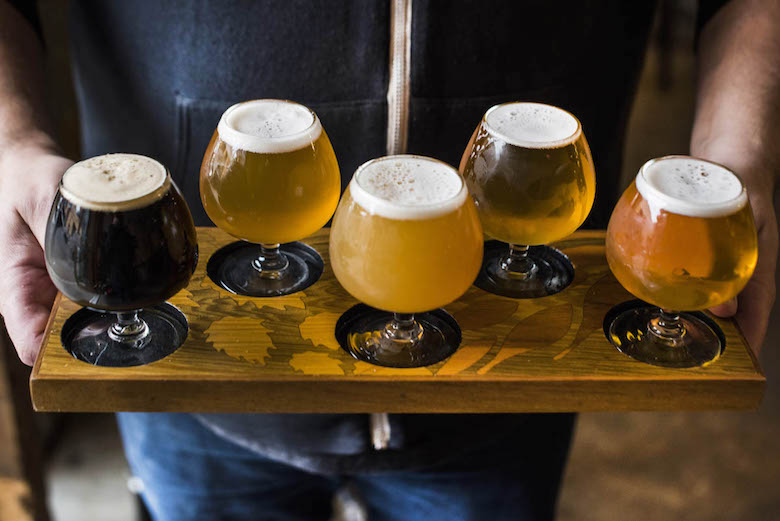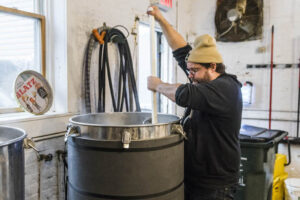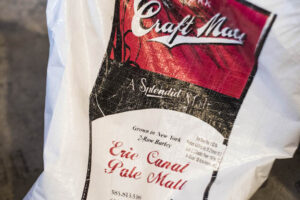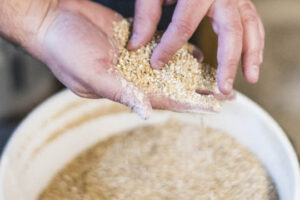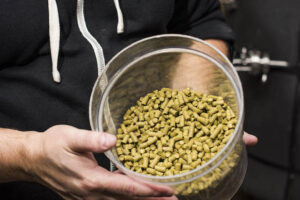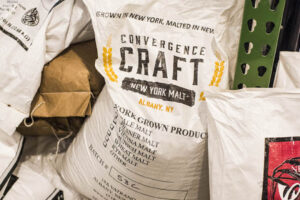
At first blush, the wooden display mounted along the right-hand wall of Strong Rope Brewery simply appears to be an homage to the elements of beer. Above hand-painted words reading “malts,” “hops,” “water” and “yeast,” what look like salvaged slatted wood crates jut out from the wall, adorned with painted ingredient symbols that evoke a board-game feel.
But this isn’t purely decorative; it’s designed to showcase the brewery’s commitment to sourcing exclusively New York State ingredients. Upon closer inspection, the crates are more like dioramas, highlighting some of Strong Rope’s business partners, such as New York Craft Malt in Batavia and Chimney Bluffs Hoppery in Wolcott.
The pint-size Gowanus business that just celebrated its third anniversary is the only brewery in New York City using exclusively in-state ingredients, according to brewer and owner Jason Sahler. While others—including KCBC in Bushwick, Big Alice in Long Island City and Grimm Artisanal Ales in East Williamsburg—use some New York State ingredients, none in the city has committed to sourcing entirely within state lines, Sahler says. There are a couple of similar operations beyond city limits, including Plan Bee Farm Brewery in Poughkeepsie, but Strong Rope is still one of only a handful of New York’s 400-plus breweries using ingredients fully grown in-state.
This status is not Strong Rope’s only special quality. They also shop at Greenmarkets in the city, buying ground cherries, rhubarb, strawberries, hardy kiwis and more to add complexity to various beers. The bar top is made from a tree felled during Hurricane Sandy and built by homebrewer and designer Shannon Bowser of Brooklyn SLaB. And guest taps go to cideries and wineries from around the state.

The beers are good, too, of course. The brewery produces a variety of styles, but it’s arguably most known for its award-winning dark beers, ranging from a steady brown ale to imperial porters and stouts. The selection on draft leans toward English ales; three bitter beers, two golden ales, two IPAs, a pale, a stout and an imperial blonde are currently in rotation. The Galactic Travel Constant, an 8.1 percent ABV stout that’s also available in cans, is particularly satisfying.
Strong Rope’s commitment to New York’s farmers and producers is admirable, but the massive size of the state stretches the definition of “local.” On a map toward the front of the taproom where pins denote the locations of suppliers, it’s easy to see just how far away some really are. New York Craft Malt, for example, stands about six hours away, between Buffalo and Sahler’s hometown of Rochester. It’s only a little closer than a traffic-free drive from Gowanus to Richmond, Virginia.
“As the crow flies, if you do 150-mile radius around us, you get a very small sliver of New York,” the bearded and burly Sahler says. “There’s not a ton within a true [local] footprint.”
Across state lines, a lot can change, including the amount of farmland and soil type, Sahler says. But maybe more importantly, there’s been a resurgence of producers in New York over the last several years thanks to changing state regulation. Strong Rope is part of a movement of “farm breweries” that draw on in-state ingredients, and it’s a part of a vibrant community of businesses and organizations working together to advance the industry and New York farmers, Sahler says. By focusing on New York, Sahler says it’s easier for businesses to come together and lobby for needed change in Albany or to work with organizations like Cornell’s Cooperative Extension to develop barley varietals.
Sahler sees himself as a sort of missionary for New York hop farmers and malt houses. Though he celebrates Strong Rope’s distinct status, he aims to convince other New York City brewers to join him in sourcing more ingredients in-state. In the end, he says, it will help everyone.

“Even over the intervening three years that we’ve been open, we’ve seen the quality [of ingredients] go up, the variety grow, the prices come down,” he says, adding that increased demand will help create a robust system that benefits breweries. Strong Rope recently hosted eight hop farms, inviting other New York City brewers to come meet them.
“There were some connections made, and hopefully some beers being brewed because of it,” Sahler says.
His overarching goal: to preserve New York farmland by turning the state into a respected agricultural region for beer ingredients, pushing it from “just a novelty thing in someone’s backyard” into a thriving industry, Sahler says.
Even though Strong Rope Brewery is now a few years in, it’s still a microbrewery, operating on a two-barrel system. (For comparison, Brooklyn Brewery uses a 50-barrel system.) But despite its small size, Strong Rope’s outsize impact is still changing the conversation about the importance—and worthiness—of building business close to home.


